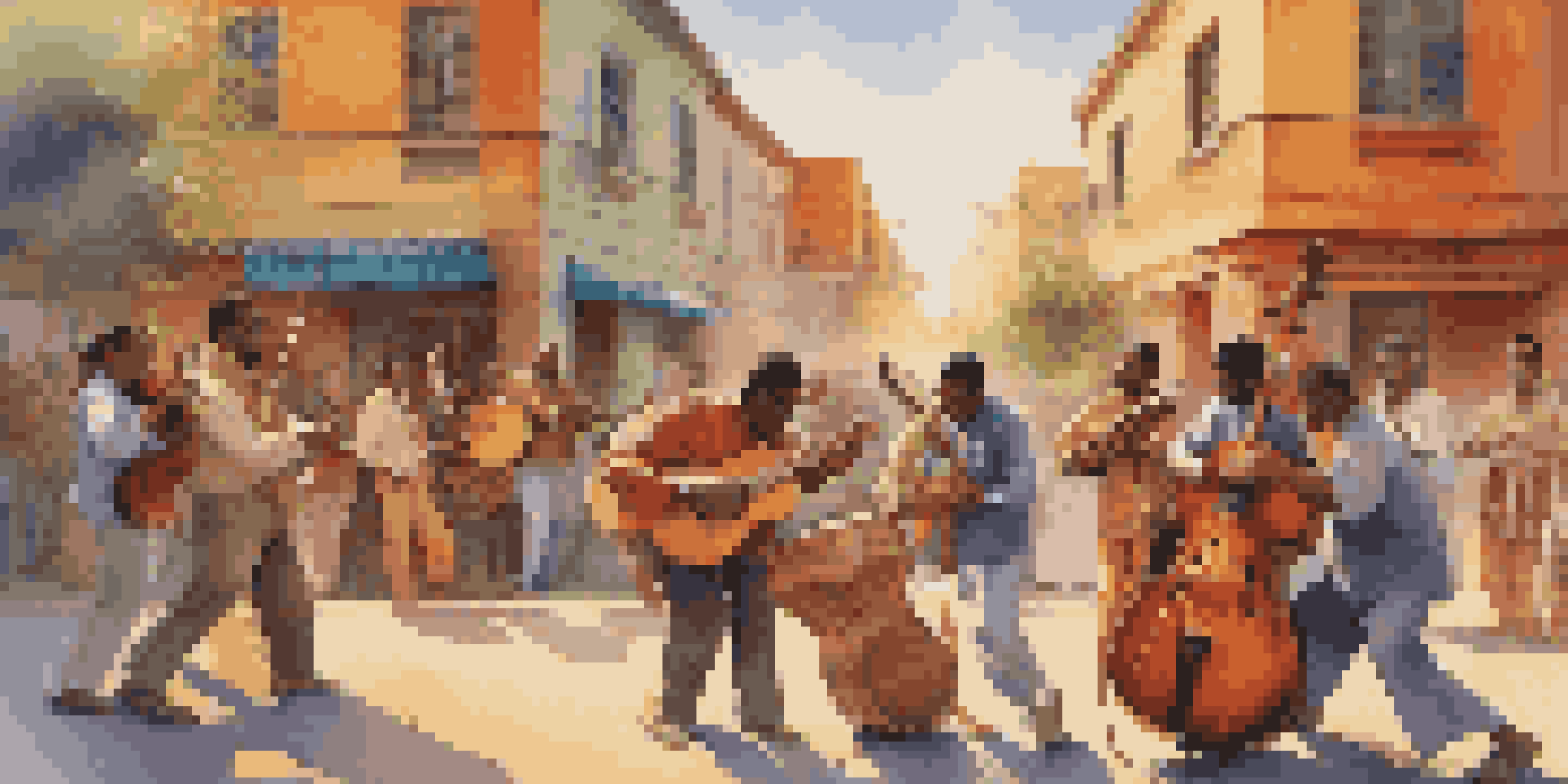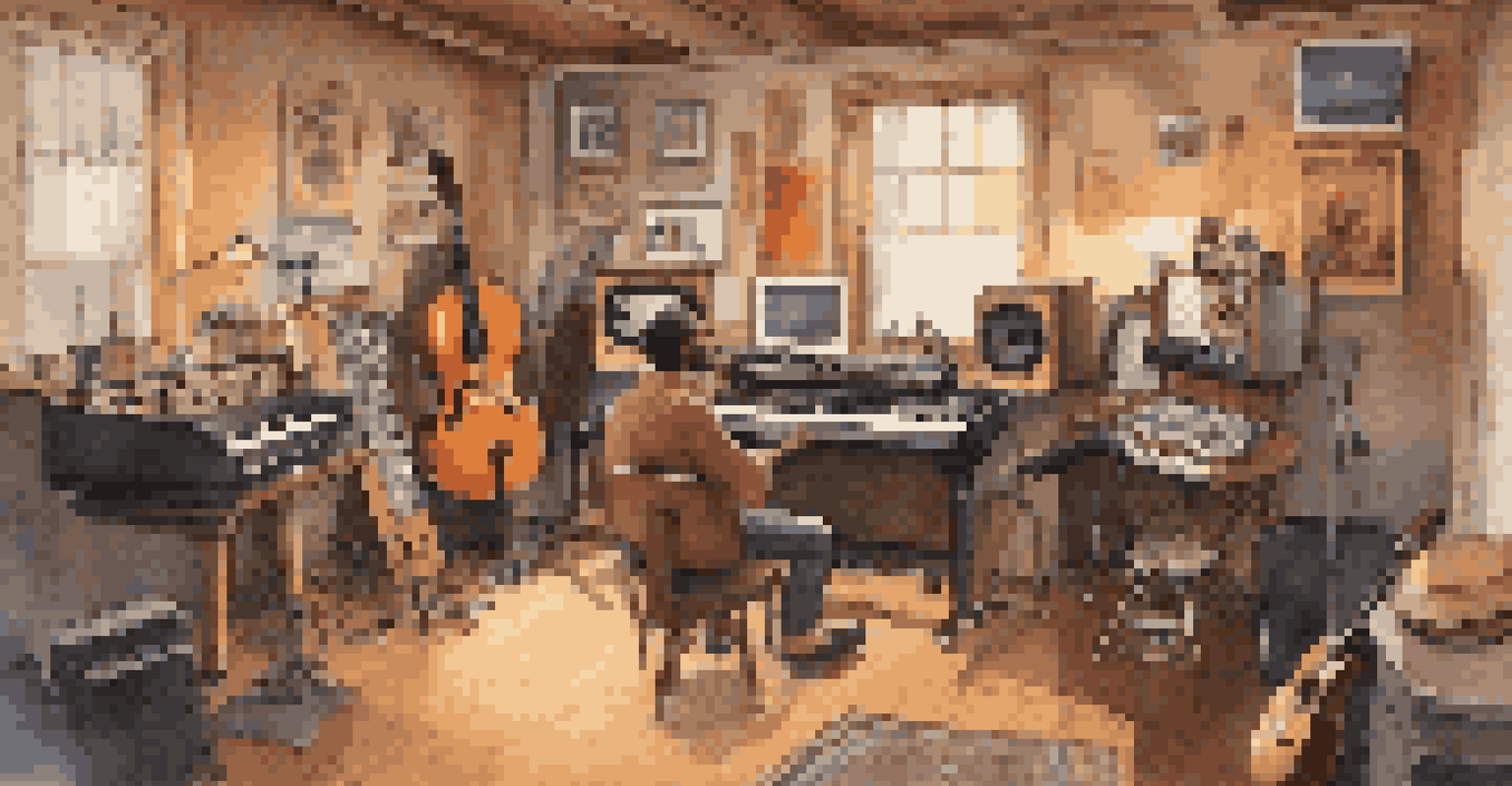Cultural Appropriation in Music: Audience Reactions and Trends

Defining Cultural Appropriation in Music
Cultural appropriation in music refers to the act of taking or borrowing elements from one culture by individuals from another, often without permission or understanding. This can include musical styles, instruments, or even dance forms that are deeply rooted in cultural significance. While borrowing can lead to fusion and innovation, it raises questions about respect, ownership, and authenticity.
Cultural appropriation is not a one-size-fits-all concept; it's about context, power dynamics, and the meaning behind cultural elements.
For example, when artists from predominantly white backgrounds adopt hip-hop elements, they might do so without acknowledging the genre's origins in Black culture. This can lead to feelings of exploitation among those whose cultural expressions are being used for commercial gain. Understanding this concept is crucial for both artists and audiences as it sets the stage for broader discussions.
By recognizing the difference between appreciation and appropriation, we can foster a more respectful dialogue around cultural influences in music. This distinction helps listeners become more conscious of the implications behind their favorite tunes and the artists behind them, ultimately leading to a richer appreciation of diverse musical landscapes.
Historical Context of Cultural Appropriation in Music
Historically, music has been a melting pot of influences, with genres like jazz, rock, and reggae drawing from various cultural roots. However, the dynamics of power and privilege play a significant role in how these influences are perceived and valued. Often, mainstream artists gain fame and profit from styles that originated in marginalized communities, leading to a complex narrative of cultural exchange.

Take Elvis Presley, for instance; he famously blended rhythm and blues with rock and roll, gaining immense popularity while Black artists like Chuck Berry and Little Richard struggled for recognition. This not only raises eyebrows about who gets credit but also highlights the disparities in the music industry. Recognizing this history helps us understand current debates surrounding cultural appropriation more deeply.
Understanding Cultural Appropriation
Cultural appropriation in music involves borrowing elements from one culture by another, often leading to exploitation without proper acknowledgment.
As we analyze these historical contexts, it becomes clear that the conversation isn't just about music; it's also about social justice and equity. By understanding past injustices, we can better navigate the present landscape and work towards a more inclusive and respectful future in music.
Audience Reactions to Cultural Appropriation in Music
Audience reactions to cultural appropriation in music can vary widely, often influenced by personal experiences and cultural backgrounds. Some fans may celebrate the blending of genres as a sign of artistic freedom, while others may feel that it undermines the authenticity of the original culture. These differing perspectives can lead to heated debates on social media and beyond.
Art is the most beautiful of all lies; it is a mirror of the culture that creates it, and that culture must be respected.
For instance, when a pop star releases a song that incorporates traditional Indigenous sounds or styles, some listeners might appreciate the tribute, while others might view it as a lack of respect for the culture. This disparity in reactions highlights the importance of understanding context and intent in music. It's not just about what sounds good—it's about who is making the music and why.
These reactions can also influence an artist's career trajectory. Negative backlash can lead to a decline in popularity, while positive responses can open doors to collaborations and new audiences. As listeners, it's essential to engage in these conversations thoughtfully, recognizing that our voices matter in shaping the music we consume.
Recent Trends in Cultural Appropriation in Music
In recent years, the music industry has seen a growing awareness of cultural appropriation, leading many artists to approach their work more thoughtfully. More musicians are now collaborating with artists from the cultures they draw inspiration from, aiming to create a sense of authenticity and mutual respect. This trend not only enriches the music but also fosters relationships between diverse communities.
For example, the collaboration between Latin artist Bad Bunny and American rapper J Balvin showcases a blending of cultures that is celebrated rather than criticized. These partnerships can act as a bridge, helping to educate audiences on the origins and significance of the music being produced. As artists become more mindful, we see a shift towards inclusivity in the creative process.
Audience Reactions Matter
Reactions to cultural appropriation vary widely among audiences, influencing artists' careers and highlighting the importance of context and intent in music.
However, while these trends are encouraging, they also highlight the ongoing need for dialogue about cultural sensitivity. Just because an artist collaborates with a member of a marginalized community doesn't automatically absolve them of appropriation concerns. It's a complex dance that requires continuous learning and adaptation from everyone involved.
The Role of Social Media in Amplifying Voices
Social media plays a pivotal role in shaping discussions around cultural appropriation in music. Platforms like Twitter, Instagram, and TikTok allow audiences to voice their opinions and experiences in real time, raising awareness about potential cultural insensitivity. This democratization of discourse empowers listeners to hold artists accountable for their actions and choices.
For example, viral hashtags and trends can quickly bring attention to instances of appropriation, prompting artists to respond or rethink their approaches. This increased scrutiny can lead to positive change, as many artists now feel the pressure to be more informed about the cultural implications of their work. The immediacy of social media also means that conversations can evolve rapidly.
However, this environment can be a double-edged sword. While it provides a platform for marginalized voices, it can also foster cancel culture, where artists face backlash without room for growth or discussion. Navigating this landscape requires a balance between accountability and understanding, encouraging constructive conversations rather than divisive rhetoric.
Artists Responding to Cultural Appropriation Critiques
Many artists are becoming more aware of the critiques surrounding cultural appropriation and are taking steps to address them. Some have issued public apologies or explanations when they've faced backlash, acknowledging their mistakes and committing to learn from them. This willingness to engage in dialogue can foster goodwill among fans and critics alike.
For instance, when a popular artist faced accusations of cultural appropriation, they took time to meet with members of the culture in question, learning about its significance and history. Such actions can demonstrate a genuine desire to show respect and appreciation rather than exploitation, turning a negative situation into an opportunity for growth.
The Impact of Social Media
Social media amplifies discussions around cultural appropriation, allowing for real-time accountability and fostering both positive change and potential backlash.
However, it’s essential for these responses to be authentic rather than performative. Fans are increasingly savvy and can quickly spot insincerity. When artists genuinely engage with the cultures they draw from, it not only enriches their music but also helps to bridge the gap between communities.
Future Directions in Music and Cultural Exchange
Looking ahead, the conversation around cultural appropriation in music is likely to evolve as more artists embrace diversity and inclusion in their creative processes. With a greater emphasis on collaboration and respect, we may see a shift towards a more equitable music industry. This could inspire a new generation of musicians who are committed to honoring the roots of the sounds they love.
Furthermore, as global connectivity increases, artists will have even more opportunities to learn about and engage with diverse cultures. Imagine a world where musicians from different backgrounds come together to create new genres that celebrate their unique influences. This vision of collaboration could lead to exciting innovations in music while promoting cultural understanding.

Ultimately, the future of music lies in the hands of both creators and consumers. By engaging in thoughtful discussions and being mindful of the cultural significance behind the sounds we enjoy, we can contribute to a more respectful and inclusive musical landscape. Together, we can ensure that cultural exchange enriches rather than exploits, creating harmony in diversity.